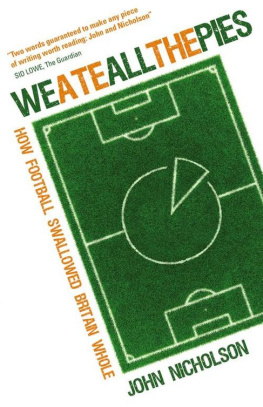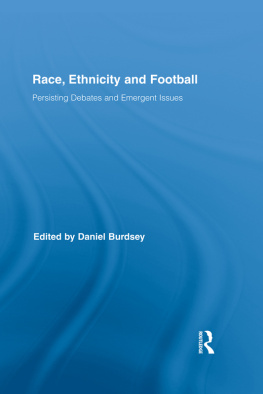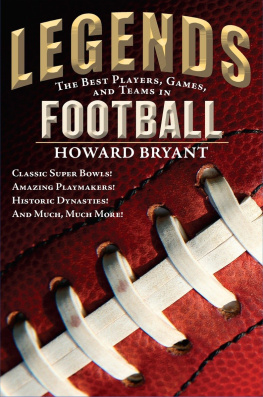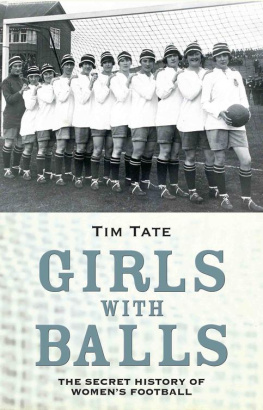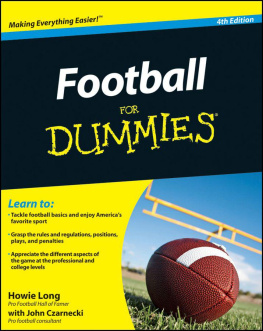Football, Family, Gender and Identity
This book presents a cross-disciplinary examination of the lived experiences of girls and women football players using theoretical insights from sports studies, psychology, sociology and gender studies.
It examines the concept of the football self your own, personal football identity that encapsulates the importance of football to our everyday lives and what that can tell us about the complex relationships between sport, family, gender and identity. The book draws on in-depth ethnographic research involving players and family members, and offers important new insights into the everyday experiences of those girls and women who play. It breaks new ground in focusing on the significant relationships between player and family with a particular focus on parenting through football. The book brings to the fore key debates around gender identity, barriers to participation, cultural gaps and discrimination. The author also brings a personal perspective to bear, drawing on experience gained over 20 years as a player, adding an extra critical layer to her important empirical research.
This is essential reading for all researchers and students with an interest in football, sport studies or issues around gender, inclusion or the family in sport, and fascinating reading for anybody generally curious about football.
Hanya Pielichaty is Associate Professor at the University of Lincoln, UK. Dr Pielichatys research and teaching expertise relate to the sociology of sport and sports business management.
Critical Research in Football
Series Editors:
Pete Millward, Liverpool John Moores University, UK
Jamie Cleland, University of Southern Australia
Dan Parnell, University of Liverpool, UK
Stacey Pope, Durham University, UK
Paul Widdop, Manchester Metropolitan University, UK
The Critical Research in Football book series was launched in 2017 to showcase the inter- and multi-disciplinary breadth of debate relating to football. The series defines football as broader than association football, with research on rugby, Gaelic and gridiron codes also featured. Including monographs, edited collections, short books and textbooks, books in the series are written and/or edited by leading experts in the field whilst consciously also affording space to emerging voices in the area, and are designed to appeal to students, postgraduate students and scholars who are interested in the range of disciplines in which critical research in football connects. The series is published in association with the FootballCollective, @FB_Collective.
Available in this series:
Football and Discrimination
Antisemitism and Beyond
Edited by Pavel Brunssen and Stefanie Schler-Springorum
Football, Politics and Identity
James Carr, Daniel Parnell, Paul Widdop, Martin J. Power and
Stephen R. Millar
Football, Family, Gender and Identity
The Football Self
Hanya Pielichaty
https://www.routledge.com/Critical-Research-in-Football/book-series/CFSFC
Football, Family, Gender and Identity
The Football Self
Hanya Pielichaty
First published 2021
by Routledge
2 Park Square, Milton Park, Abingdon, Oxon OX14 4RN
and by Routledge
605 Third Avenue, New York, NY 10158
Routledge is an imprint of the Taylor & Francis Group, an informa business
2021 Hanya Pielichaty
The right of Hanya Pielichaty to be identified as author of this work has been asserted by her in accordance with sections 77 and 78 of the Copyright, Designs and Patents Act 1988.
All rights reserved. No part of this book may be reprinted or reproduced or utilised in any form or by any electronic, mechanical, or other means, now known or hereafter invented, including photocopying and recording, or in any information storage or retrieval system, without permission in writing from the publishers.
Trademark notice: Product or corporate names may be trademarks or registered trademarks, and are used only for identification and explanation without intent to infringe.
British Library Cataloguing-in-Publication Data
A catalogue record for this book is available from the British Library
Library of Congress Cataloging-in-Publication Data
A catalog record has been requested for this book
ISBN: 978-0-367-35235-6 (hbk)
ISBN: 978-1-032-04196-4 (pbk)
ISBN: 978-0-429-33015-5 (ebk)
Typeset in Times New Roman
by codeMantra
This book is dedicated to my wonderful family: Mum,
Dad, Joe, Gavin, Benji and Ada as well as the many
friends I have made through football.
Contents
List of figures
2 The girls and womens footballscape
3 The football self
4 Gender and the binary evolution
5 Football families
6 Parenting in girls and womens football
7 Gendered parenting
8 Gender justice and social change: beyond the football self
Figures
3.1 The Football Self Continuum
4.1 West Bromwich Albion Women FC circa 2009
5.1 Yorkshire Copper Works Match, Patricia Robinson on the Ball (c1953) courtesy of Helena Pielichaty
6.1 The Parental Continuum
1 Introducing me and football
I was the first girl in the history of my primary school to play on the boys football team. This had no significance to me at the time but it did create some interesting social situations. One of which took place at an awards ceremony following a tournament victory. My team and I were stood in a row waiting patiently for a man to put medals around our necks to symbolise our achievement. After each medal placement the man shook a players hand before moving on to the next recipient. It was finally my turn; I proudly waited for my medal and handshake, even positioning my right hand out in front of me ready. But what followed wasnt a handshake at all My parents described the next move to me (years later) as an almost falling backwards; I prefer to think of it as a Neo style hyper-extension of the back, dodging bullets, akin to The Matrix film. It wasnt bullets that came towards me though, but rather the medal man had attempted to kiss me on the cheek! My response to which was to fling my face and body out of the way in a desperate scuttle to evacuate the area to much amusement from the parent spectators. As a nine year old footballer, the last thing you want is a kiss on the cheek! Where was my handshake?
My childhood bedroom walls were covered with centre-piece programme pull-outs of Andy Booth and Ronnie Jepson rather than more typical tributes to Take That and the Spice Girls. Growing up in the 90s in the English East Midlands, with a strange sounding last name, and a love for Huddersfield Town and all things football was not the classic formula for British girlhood.
Around the age of nine I seemed to do nothing but kick a ball about. I didnt think much of being the first ever girl to be selected for the boys football team at primary school: I just wanted to play. The relationship between school and football is extremely important (see Emmanuel, 2017; Clark and Paechter, 2007; Swain, 2000). My love for football continued into my later school years. The step up to secondary school is significant in terms of child development and sustaining participation in sport. In general, from late childhood, girls and boys opportunities to participate in mixed sports lessons become limited. There are schools in the UK that continue to segregate PE lessons on the basis of gender, even though they are not required to do so, a potential legacy from the Victorian era (Lawson, 2013). As Stirling and Schulz comment, whatever strides are gained become lost as soon as the girls commence secondary school, due to the absence of football from the curriculum (Stirling and Schulz, 2011, 53). Only 47% of schools within the Union of European Football Associations (UEFA) member associations have football on the curriculum for girls (FIFA, 2014).


